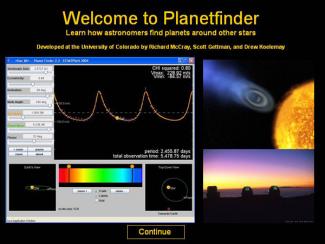In JILA Fellow Dick McCray’s view, the way students learn astronomy is nearly the reverse of the way early astronomers learned astronomy. For instance, students might first learn Newton’s law of gravity and Kepler’s laws of planetary motion and then complete exercises in which they calculate what scientists have observed. But that’s not how Kepler did it. He fit observations of planetary motion with a controversial mathematical model that was much later confirmed to be correct by Newton’s theory of gravity.
To counter methods that simply teach students “how it is,” McCray has developed the Planetfinder learning module (http://stem.colorado.edu/planetfinder/instructor.html) to encourage learning by discovery. The module demonstrates that science is often concerned with evaluating degrees of uncertainty in conclusions. McCray thinks that asking students to go through a process of fitting data to a model and estimating uncertainty helps them better understand not only the particular principle being taught, but also how science really works.
Planetfinder explores the discovery of extrasolar planets. Astronomers detect new planets by analyzing the Doppler shift (caused by the gravitational field of the planet) in the electromagnetic spectrum of the planet’s star. Students are provided with a set of data points that simulate observations of real systems, with statistical uncertainty built into the data. The model for calculating a star’s Doppler shift is built into the program, and students can adjust variables, such as planetary mass, to fit the data. They can evaluate the quality of their fit and compare their results against known values. Throughout the process, they answer questions about the subject and their process as well as provide feedback to their teacher. They also make suggestions for improving the module.
McCray hopes that the hands-on exercise will show students that analyzing measurements is as much a part of the scientific process as forming theories that explain scientific results. Then students who continue their studies in science as well as those who do not may better appreciate how science is carried out. - Ryan Smith



 The Physics Frontiers Centers (PFC) program supports university-based centers and institutes where the collective efforts of a larger group of individuals can enable transformational advances in the most promising research areas. The program is designed to foster major breakthroughs at the intellectual frontiers of physics by providing needed resources such as combinations of talents, skills, disciplines, and/or specialized infrastructure, not usually available to individual investigators or small groups, in an environment in which the collective efforts of the larger group can be shown to be seminal to promoting significant progress in the science and the education of students. PFCs also include creative, substantive activities aimed at enhancing education, broadening participation of traditionally underrepresented groups, and outreach to the scientific community and general public.
The Physics Frontiers Centers (PFC) program supports university-based centers and institutes where the collective efforts of a larger group of individuals can enable transformational advances in the most promising research areas. The program is designed to foster major breakthroughs at the intellectual frontiers of physics by providing needed resources such as combinations of talents, skills, disciplines, and/or specialized infrastructure, not usually available to individual investigators or small groups, in an environment in which the collective efforts of the larger group can be shown to be seminal to promoting significant progress in the science and the education of students. PFCs also include creative, substantive activities aimed at enhancing education, broadening participation of traditionally underrepresented groups, and outreach to the scientific community and general public.